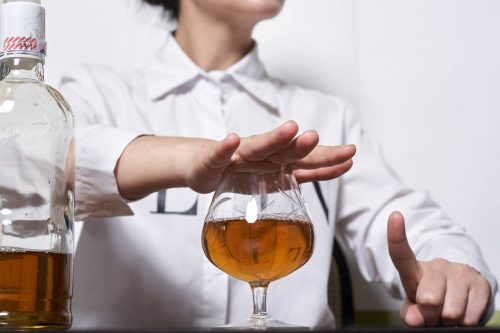A herniated disc is one of the most common causes of neck, back and leg pain. It is a pathology that can heal on its own or through home care. However, avoiding alcohol consumption can speed recovery. In this article, we take stock of the link between herniated disc and alcohol.
Focus on herniated disc
Definition
A herniated disc is a spinal pathology. The vertebrae are a series of bones with discs between them. These discs act like buffers between your bones. This allows you to bend and move around easily, as they cushion shocks between each of the vertebrae.
LWhen one of these discs tears or leaks, it is called a herniated disc.
Symptoms of a Herniated Disc
The symptoms of herniated disc (at the lumbar level) include numbness, weakness and pain in the leg, foot, buttock and lower back.
When the herniated disc is at the cervical level, it rather affects the neck and the upper limbs (and can cause paresthesias such as ants in hands).
Pain may occur and vary depending on the case. In general, certain movements, such as lean forward, coughing, sneezing and straining make the pain worse.
In general, a herniated disc can heal on its own or with well-conducted conservative treatment. Do not hesitate to consult a health professional to clarify the diagnosis and benefit from appropriate care.
Besides, it is essential to consult your doctor if you are suffering from cauda equina. This is pain in a bundle of nerves originating from the lower end of the spinal cord in your lower back. This leads to loss of bladder and bowel control.
It is also possible that the disc is pressing on the spinal cord (myelopathy). This will cause weakness or even paralysis of both legs, although this is rare.
Aggravating factors
Herniated discs show up as pain in the neck or arm (cervical hernia), or even in the back and in the leg (lumbar disc herniation). Several causes can explain this, such as aging, which causes the disc to dry out and crack.
Furthermore, being overweight pushes the body into postures that deter the natural shape of the spine. This fpossibly a herniated disc.
Herniated disc and alcohol
The effects of alcohol on the body
Alcohol affects all normal body functions. It dehydrates the body. Indeed, alcohol blocks the production of vasopressin, an antidiuretic hormone produced in the brain by the hypothalamus. This hormone has the role of controlling the amount of water in the body. If you abuse alcohol, the amount of vasopressin is reduced and water will be eliminated in the urine. The dehydration affects every cell in the body, including bone cells.
How does alcohol promote herniated disc?
Dehydration in the body means that all organs, including your discs, lack water. This water reduction causes pain from friction or from the discs pressing on the nerves around the spine.
Alcohol and joint pain
Some scientists say that alcohol would be a good idea for the joint, others are against this opinion. Drinking alcohol in moderation is normally safe, it may even reduce certain types of inflammation. It has been shown that consuming a small amount of alcohol can reduce the risk of developing arthritis.
However, heavy drinking can cause problems. Alcohol can also interfere with some disease-fighting medications, with serious health consequences. Before drinking alcohol, it is important to talk to a doctor about the risks and benefits.
How to relieve and treat herniated disc?
Good gestures
Pain can be reduced by exercising and maintaining a healthy weight. Although not formally proven, it is believed that sufficient water also helps to replenish the discs for proper functioning of the vertebrae.
In addition, it is important to pay attention to your lifestyle so as not to aggravate the herniated disc. To do this, adjust your posture and avoid prolonged sitting, which can aggravate symptoms.
Diet also plays a role in healing, promote anti-inflammatory foods. Here are some examples.
- Garlic: contains allicin which has antioxidant and anti-inflammatory effects.
- Fruits and vegetables: healthy, unprocessed foods.
- Green tea: contains flavonoids that fight against free radicals which are responsible for premature aging in the body.
- Egg yolk: helps fight chronic pain thanks to the vitamin A, B, E and D it contains.
- Shellfish: contain antioxidants ensuring the good health of your joints.
- Cabbage: promotes joint health.
- Oily fish: contains omega-3 to reduce pain.
- Mineral water: rich in magnesium and calcium.
What is the ideal dose of alcohol?
It is advisable to limit yourself and follow some rules on the dose of alcohol not to exceed.
- If you drink alcohol daily, be sure not to exceed one drink per day.
- For occasional drinkers, the dose is 2 glasses maximum.
- Limit consumption by doing 1 or 2 days without alcohol.
- Do not drink more than 7 glasses in a week.
You will see the beneficial effects of alcohol if you can limit yourself as well. Don't forget to drink plenty of water.
Some types of alcohol are a little less dangerous than others. Wine is more recommended. The beer on the other hand increases a risk of coxarthrosis and gonarthrosis.


